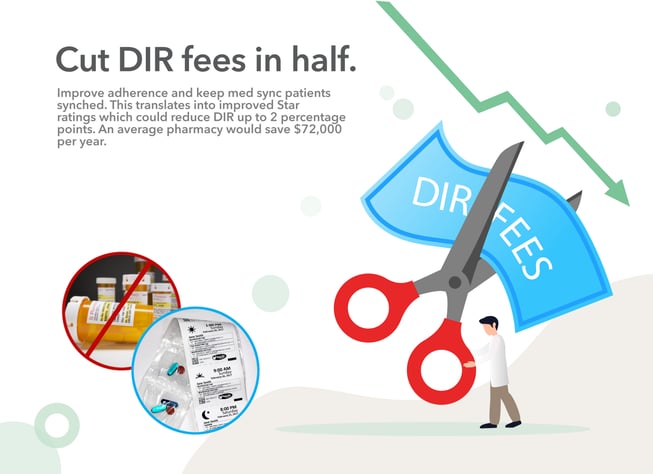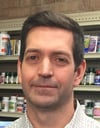

 "What we've noticed, over the last year in particular, is DIR fees have really become an issue, and especially with CVS Caremark, on a trimester clawback basis," says Ollin Sykes, CPA. "Most others are doing it monthly. But, those that have Star ratings at five, on an average basis, versus those that have Star ratings four average, that those that have Star ratings of five, we're seeing DIR fees under 2%. Those that have Star ratings of four, four and a half, DIR fees can be anywhere up to four, four and a half percent."
"What we've noticed, over the last year in particular, is DIR fees have really become an issue, and especially with CVS Caremark, on a trimester clawback basis," says Ollin Sykes, CPA. "Most others are doing it monthly. But, those that have Star ratings at five, on an average basis, versus those that have Star ratings four average, that those that have Star ratings of five, we're seeing DIR fees under 2%. Those that have Star ratings of four, four and a half, DIR fees can be anywhere up to four, four and a half percent."
Sykes says there's a clear correlation, a dollar correlation, between what's happening on the adherence side and the med sync side.
"When you take one percentage point of the average pharmacy in this country, which is about 3.6 million in retail sales, that's $36,000," Sykes continues. "So if you can reduce that one or two percentage points by increasing your Star ratings by having the technology in place like we're talking about here, that's a game changer."
What do RapidPakRx owners say about reducing DIR fees with improved adherence? Here are some PDS members, sharing their experience with improved adherence and savings on DIR.

“RapidPakRx has changed the way we do pharmacy. We’ve seen our sync program triple in size since installing the RapidPakRx in December 2018. Our CVS Caremark performance scores are through the roof! This machine will pay for itself in two years just from saved DIR fees."
-- PDS Member Brett Moore, RPh, Owner, Moore's Pharmacy, Sebastopol, Mississippi
 "We all know pharmacies of pretty good size, they could be seeing $100,000 to $200,000 a year in DIR. So we need to minimize that the best we can, and I think adherence packaging just makes it a more seamless process to try to maximize a reimbursement. You've gotta make sure you're getting a five Star rating on every single plan, so that does make a big difference. You have to ask, who are these patients that we can get into adherence packaging to take from 75% adherence up to basically 99% adherence, so that we can improve our DIR dramatically. Sometimes it's just a matter of one to two patients sometimes on these different health plans and the different scores. And I would say that reducing DIR alone, if you can have a program to improve that, we're getting our money back, you know? DIR savings alone can pay off a unit pretty dang quick if we can just maximize our adherence on our patients. So for us, we found adherence packaging to be a big advantage. "
"We all know pharmacies of pretty good size, they could be seeing $100,000 to $200,000 a year in DIR. So we need to minimize that the best we can, and I think adherence packaging just makes it a more seamless process to try to maximize a reimbursement. You've gotta make sure you're getting a five Star rating on every single plan, so that does make a big difference. You have to ask, who are these patients that we can get into adherence packaging to take from 75% adherence up to basically 99% adherence, so that we can improve our DIR dramatically. Sometimes it's just a matter of one to two patients sometimes on these different health plans and the different scores. And I would say that reducing DIR alone, if you can have a program to improve that, we're getting our money back, you know? DIR savings alone can pay off a unit pretty dang quick if we can just maximize our adherence on our patients. So for us, we found adherence packaging to be a big advantage. "
-- PDS Member Ben McNabb, RPh, Owner, Love Oak Pharmacy, Texas
 "Obviously everybody wants to reduce their DIR fees in some form or fashion. What we've noticed is, I think the national average as far as a chronic care patient, you're looking at 65% of those people are the only ones that take their medicine right. That means 35% are not. And I know everyone has patients that do not take their medicine and do not take it correctly. We have a pretty big med sync population and we have to look at that and what we see is that these people are on sync and today, and they should be picking their medication up and they're not. And they're not the next day, so pretty soon they're four or five days late. And then suddenly they're six or seven days late and now that's one of your outliers you have to take care of, otherwise you're going to see bad DIR fees. So that's a process by which we say, 'Okay, let's take this patient and let's say what can we do to better serve them?' Probably the best thing we can do is offer them adherence packaging."
"Obviously everybody wants to reduce their DIR fees in some form or fashion. What we've noticed is, I think the national average as far as a chronic care patient, you're looking at 65% of those people are the only ones that take their medicine right. That means 35% are not. And I know everyone has patients that do not take their medicine and do not take it correctly. We have a pretty big med sync population and we have to look at that and what we see is that these people are on sync and today, and they should be picking their medication up and they're not. And they're not the next day, so pretty soon they're four or five days late. And then suddenly they're six or seven days late and now that's one of your outliers you have to take care of, otherwise you're going to see bad DIR fees. So that's a process by which we say, 'Okay, let's take this patient and let's say what can we do to better serve them?' Probably the best thing we can do is offer them adherence packaging."
-- PDS Member Trey Crawford, RPh, Owner, C&C Drugs, Mississippi
 "Insurance companies are the only industry that will reimburse somebody at the point of sale, and then come back six months later and say, "Oh, by the way, you owe me half your profits,” or whatever it is. It's very, very difficult to budget personnel who you're going to hire. You don't know what your reimbursement is because you sell it and you think you make x-amount of dollars and then six months later they come back and they take it away from you. So, instead of making $50, we turn around and they take $150 from us. They don't just take profits, they arbitrarily take what they want. That's the biggest issue by far. The higher your Star ratings are, the higher your reimbursement is. Now, it doesn't offset the DIR fees, but we have found that that's the only way to combat it because we can't control what they take back from us. We can only control what we do here."
"Insurance companies are the only industry that will reimburse somebody at the point of sale, and then come back six months later and say, "Oh, by the way, you owe me half your profits,” or whatever it is. It's very, very difficult to budget personnel who you're going to hire. You don't know what your reimbursement is because you sell it and you think you make x-amount of dollars and then six months later they come back and they take it away from you. So, instead of making $50, we turn around and they take $150 from us. They don't just take profits, they arbitrarily take what they want. That's the biggest issue by far. The higher your Star ratings are, the higher your reimbursement is. Now, it doesn't offset the DIR fees, but we have found that that's the only way to combat it because we can't control what they take back from us. We can only control what we do here."
-- PDS Member Mark Mula, RPh, Owner, Mula Family Pharmacy, Louisiana
 “Since installing the RapidPakRx we've been able to increase our packaging program quite a bit. It's much more efficient. Because of that, we've increased our patient's adherence, which goes directly to our Star rating and the reduction of our DIR Fees. We have a sync program that we run. And even with a sync program, you have patients that don't pick up on their sync dates because they've missed taking their medications. But with the PakMyMeds program, the patients stay adherent. They know if they've taken their medications, they stay on schedule and they're able to come once a month to the pharmacy and pick up their medications."
“Since installing the RapidPakRx we've been able to increase our packaging program quite a bit. It's much more efficient. Because of that, we've increased our patient's adherence, which goes directly to our Star rating and the reduction of our DIR Fees. We have a sync program that we run. And even with a sync program, you have patients that don't pick up on their sync dates because they've missed taking their medications. But with the PakMyMeds program, the patients stay adherent. They know if they've taken their medications, they stay on schedule and they're able to come once a month to the pharmacy and pick up their medications."
-- PDS Member Bruce Gibson, RPh, Co-Owner, Gibson Pharmacy, Texas

Brett Moore, RPh
Pharmacist/Owner - Moore's Pharmacy

Kyle Lomax, RPh
Pharmacist/Owner - Southern Pharmacy

RxSafe, LLC
2453 Cades Way
Suite A
Vista, CA 92081
TOLL FREE: 877-469-2768
PHONE: 760-593-7161